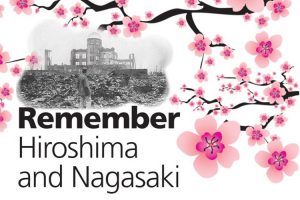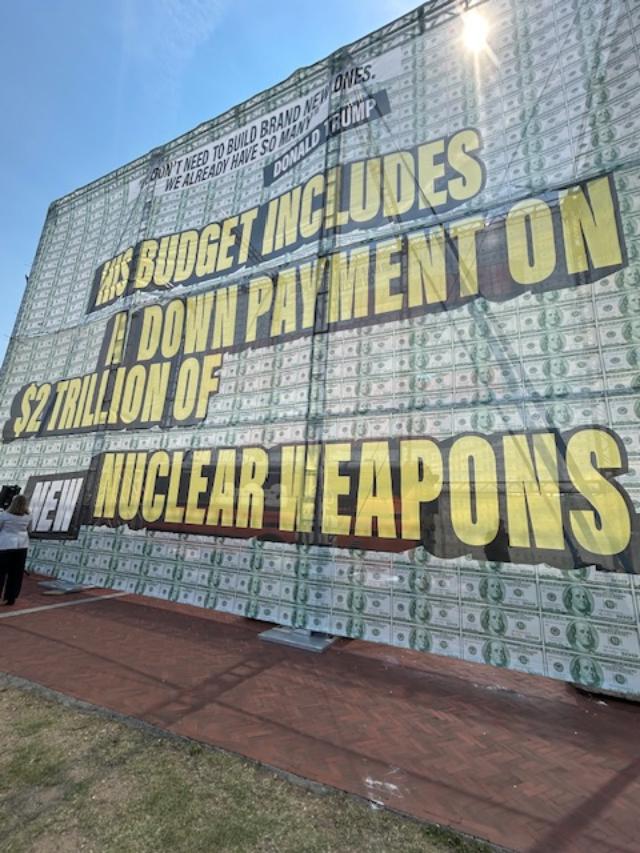Proliferation begins at home. That has never been clearer than now, as the United States embarks on what many scientists at its nuclear weapons laboratories are calling “the second nuclear age.” The United States plans to spend $1 trillion over the next 30 years to “modernize” all aspects of its nuclear arsenal: the bombs and warheads, the production facilities, the delivery systems, and command and control systems.
This plan directly benefits the private corporations that are invested in the maintenance and production of nuclear weapons and raises major questions of accountability. The directors of the Los Alamos, Livermore, and Sandia weapons labs also serve as CEOs of the for-profit corporations that are contracted to manage the labs. When they propose a never-ending cycle of Life Extension Programs, they are literally lining their own pockets!

Trillion Dollar Trainwreck focuses primarily on the FY 2017 budget for nuclear weapons and wastes. It highlights Life Extension Programs (LEPs), proposed new production facilities, and other projects at Department of Energy sites. Most of them are completely unnecessary for national security. All of them are mismanaged, behind schedule, and wildly over budget.
Despite a clear obligation under Article VI of the Nuclear Non-Proliferation Treaty to “pursue negotiations in good faith on effective measures relating to cessation of the nuclear arms race at an early date,” the United States continues to pursue LEPs that introduce exotic elective changes to the nuclear stockpile. Many LEPs will result in nuclear weapons with new military capabilities — contrary to promises made in the 2010 Nuclear Posture Review and assertions made by President Obama at the Nuclear Security Summit in March 2016.
The modernization programs outlined in this report, if carried out, will create untold tons of additional radioactive waste. This would be irresponsible under the best of circumstances. Given the indefinite closure of the Waste Isolation Pilot Plant and the absence of any method of responsibly treating and storing high-level waste, the plan is reckless. Considering the astounding mess that already exists at former nuclear weapons production sites, including the Hanford Reservation, the Savannah River Site and many others, any proposal that will create additional waste is inexcusable.
Above: Marylia Kelley, Executive Director of Tri-Valley CAREs and co-author of Trillion Dollar Trainwreck, discussed the report on Democracy Now on April 13, 2016.
Communities around former and current weapons facilities face ongoing, increasing risks because the Department of Energy does not clean up its messes. In Washington state, leaking underground tanks are releasing high-level radioactive waste. Across the weapons complex, hundreds of abandoned nuclear production facilities remain contaminated, forcing NNSA to spend millions on maintenance to try to contain contaminants. While DOE demands, and Congress grants, an ever-larger budget for its nuclear weapons program, the budget to address DOE’s environmental mess is nearly flat year after year.
Add to this the problems with nuclear waste that has been generated over the past seven decades — high-level waste, transuranic waste, commercial spent nuclear fuel. Each kind of waste requires its own storage or disposal path. DOE’s attempts to build facilities or to persuade communities to host waste dumps is prone to the same mismanagement and procedural failures as its over-budget and over-schedule construction projects. For the time being, the safest, least expensive, and most sensible option is to store waste safely and securely where it is generated.
The Alliance for Nuclear Accountability, acting as a public interest watchdog over one of the federal government’s most dysfunctional agencies, can be expected to be critical of the culture of mismanagement and waste that prevails across the weapons complex. But there are some positive signs in the President’s FY 2017 budget that should be reinforced.
The DOE request that the Mixed Oxide fuel project (MOX) be terminated is one example. After years of throwing good money after bad, this pork-barrel project is finally getting what it deserves: closure. While termination of the project will cost $500 million or more, it will result in significant cost savings in the long-term and will allow the United States to pursue safer, more sensible alternatives for plutonium disposition.
The W78/88-1 Interoperable Warhead, which was delayed for five years in the FY2015 budget, should be cancelled outright. The cost of this plan, which is opposed even by the Navy, is in the tens of billions of dollars. Even more worrying, the radical changes that could ensue from the mash-up of designs and components may compromise the weapon’s reliability, leading to pressure to resume full-scale nuclear testing.
Trillion Dollar Trainwreck recommends an alternative approach to the nation’s nuclear weapons stockpile — Curatorship — that would avoid making unnecessary and destabilizing changes to warheads.
Curatorship is a conservative approach that requires rigorous surveillance of the active stockpile on an ongoing basis. Components are replaced only if compelling evidence from surveillance demonstrates that they have degraded to a point that significantly compromises safety or reliability. Replacement parts would be (re)manufactured as closely as possible to their original designs, with a bias toward minimizing changes and preserving the weapon’s reliability. Elective modifications to upgrade weapons would be curtailed.
While Curatorship is not in and of itself the disarmament called for under the Non-Proliferation Treaty, foreswearing novel designs and features is more consistent with our treaty obligations and more supportive of our global nonproliferation objectives than the current program.
Examined together, the issues raised in this report are cause for great alarm. Some problems can be alleviated and dramatic cost savings realized by scrapping plans for future projects or reining in unnecessary elements. Other problems, most notably existing environmental contamination and high-level waste, must be addressed by redirecting the ever-rising budget for nuclear weapons production to cleaning up the widespread, dangerous mess that has already been made.
Failure to do so places workers, the public and the environment at ever greater risk of catastrophic consequences.
Contributors to the Alliance for Nuclear Accountability’s Trillion Dollar Trainwreck report include:
Beatrice Brailsford – Snake River Alliance, Pocatello, Idaho
Tom Clements – Savannah River Site Watch, Columbia, South Carolina
Jay Coghlan – Nuclear Watch New Mexico, Santa Fe, New Mexico
Don Hancock – Southwest Research and Information Center, Albuquerque, New Mexico
Alexis Hill – Nuclear Age Peace Foundation, Santa Barbara, California
Ralph Hutchison – Oak Ridge Environmental Peace Alliance, Oak Ridge, Tennessee
Marylia Kelley – Tri-Valley CAREs, Livermore, California
Scott Kovac – Nuclear Watch New Mexico, Santa Fe, New Mexico
Liz Mattson – Hanford Challenge, Seattle, Washington
Bob Schaeffer – Public Policy Communications, Sanibel, Florida
Rick Wayman – Nuclear Age Peace Foundation, Santa Barbara, California





